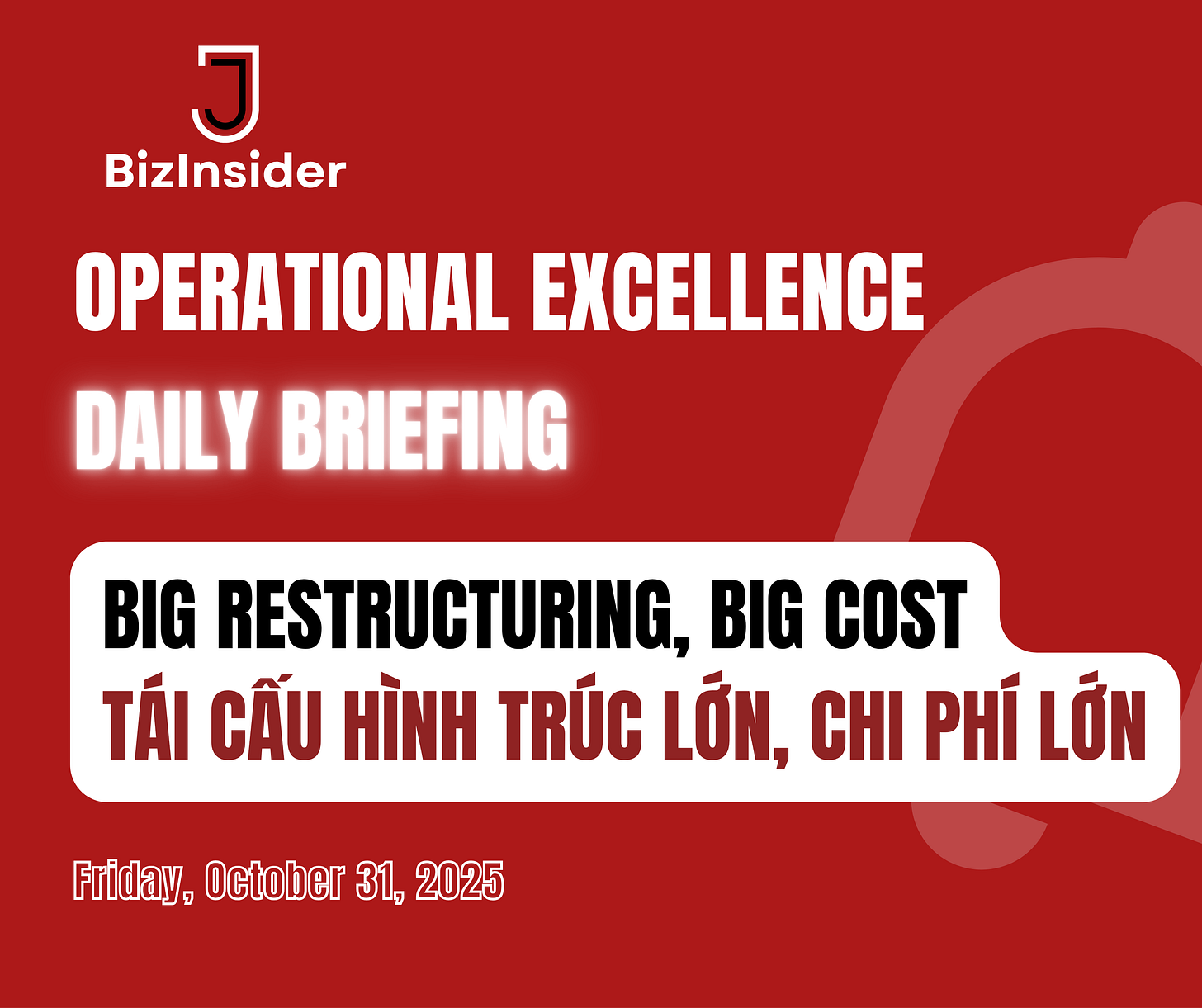Operational Excellence (OPEX) Daily Briefing – Friday, October 31, 2025: Big Restructuring, Big Cost: An OPEX Lesson from ANZ.
Điểm Tin Operational Excellence (OPEX) Mỗi Ngày – Thứ Sáu, Ngày 31/10/2025: Tái Cấu Trúc Lớn, Chi Phí Lớn: Bài Học OPEX Từ ANZ.
Welcome to my unique weekday article for the paid subscriber-only edition.
Operational Excellence (OPEX) Daily Briefing – issued on weekdays (Monday to Friday).
Điểm tin Operational Excellence (OPEX) hằng ngày (phát hành các ngày thứ Hai đến thứ Sáu).
This is the bilingual post in English and Vietnamese. Vietnamese is below.
Đây là bài viết song ngữ Anh-Việt. Tiếng Việt ở bên dưới.
English
Part 1: Official Statement – ANZ and the Cost of a Large-Scale Restructuring
On October 31, 2025, the Australia and New Zealand Banking Group (ANZ) — one of Australia’s “Big Four” banks — announced that it would record approximately AUD 1.11 billion in charges for the second half of the 2025 fiscal year.
This amount includes restructuring costs, workforce reduction expenses, and regulatory compliance costs, all of which will directly impact the bank’s short-term profitability.
According to official statements from ANZ, as reported by Reuters and Bloomberg, the bank will allocate:
• AUD 414 million for a restructuring and operational realignment program;
• AUD 264 million for compliance and legal costs, related to supervisory requirements from the Australian Securities and Investments Commission (ASIC) and other international regulators;
• And around AUD 78 million to wind down Cashrewards, a cashback platform previously acquired by ANZ but no longer aligned with its core strategic focus.
An ANZ spokesperson stated that these charges are part of a comprehensive transformation plan aimed at simplifying operations, improving productivity, and preparing for long-term growth amid rapid change across the global banking sector.
The bank emphasized that these are one-off expenses, which are expected to yield long-term benefits through a more streamlined organization and modernized processes.
However, market reactions have been cautious.
Some investors expressed concern that such a large-scale reduction could cause short-term disruption, while the restructuring costs would immediately weigh on profits.
Meanwhile, analysts from the Australian Financial Review and Morningstar noted that the size of these charges highlights the complexity of ANZ’s current operational system, especially as the bank simultaneously advances multiple initiatives in digital transformation, mergers, and technology upgrades.
In other words, this is not merely a “staff reduction exercise”, but a complete overhaul of ANZ’s operating system — spanning organizational structure, technology infrastructure, and internal processes.
A Sydney-based financial expert commented:
“When an organization needs to spend hundreds of millions to restructure, it suggests that the system had become too complex and inflexible to adapt to change.”
From the perspective of Operational Excellence (OPEX) — the discipline focused on optimizing processes and eliminating waste — ANZ’s restructuring illustrates the tension between growth and efficiency.
Many organizations can achieve revenue growth and scale, but without standardized processes, each expansion adds new operational costs and risks instead of value.
In that sense, restructuring expenses are not merely the cost of workforce reduction, but rather an essential investment to enable the organization to operate more efficiently in the future.
ANZ has maintained its full-year profit guidance and reaffirmed that these charges will help the bank build a leaner, more agile, and more resilient foundation for the next phase of growth.
Nonetheless, this case serves as a reminder for the broader financial sector:
“Restructuring is not just about people — it’s about the processes and systems that support them.”
When restructuring costs reach into the hundreds of millions, the key lesson lies not in who is being cut, but in whether the organization has adequately prepared its systems and workflows for change without losing performance.
And that is precisely the central question that Operational Excellence (OPEX) seeks to answer —
how to transform effectively without letting short-term disruption outweigh long-term benefit.




